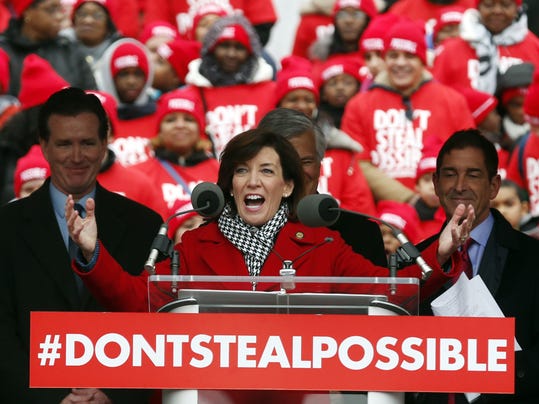Editorial: Change N.Y.'s 'failing schools' narrative
The debate over the state education budget is still being driven by the false notion that New York's schools are "failing." It's time for critics of the state's reforms to cast a new narrative.

Credit the state Board of Regents led by Chancellor Merryl Tisch, former Education Commissioner John King and Gov. Andrew "Break the Monopoly" Cuomo for holding tight to a "failing schools" narrative. They've kept their critics on the defensive and warded off substantive discussions about the true state of almost 700 diverse school districts.
Oddly enough, if Cuomo gets what he seems to want most, a really bad teacher evaluation system, the results could eventually blow up in his face.
Many agendas
How is the budget debate shaping up? On Wednesday, thousands of charter-school advocates gathered in Albany to support Cuomo's contention that public schools stink and that privately run, tax-funded charters are the alternative. One charter school chain closed schools so that everyone could participate, sending a strange message about prioritizing politics over schooling.
NYSUT, the state's powerful teachers union, has been holding rallies in Albany and elsewhere to fight Cuomo's agenda and demand more equitable funding for education. NYSUT has been slow to release its own vision of a fair, meaningful teacher evaluation system, missing a prime opportunity to influence lawmakers who are trying to decide what to do with Cuomo's plans.
A consortium of big education groups representing school boards, superintendents and others recently called for reforms to the state's property-tax levy cap. This is a tall order when polls show public support for Cuomo's prize initiative – despite the governor's failure to deliver promised relief from state mandates that drive up local property taxes.
Other groups continue to rally against the Common Core standards and the related standardized tests. It will be interesting to see how many parents will stop their kids from taking the state's ELA and math tests next month. Last year, an estimated 50,000 to 60,000 students in New York did not take the tests for grades 3 to 8.
Opponents of the myriad issues that make up the state's "reform" agenda have so far been unable to present a compelling alternative to the now-familiar "failing schools" narrative. Such a narrative needs accuracy and nuance; the needs of urban, suburban and rural districts vary widely. And many of New York's schools are not failing. In fact, many are thriving and would do better if left alone by Albany.
A different vision
Such a narrative would have to focus on the effects of poverty on big-city schools and offer fresh perspectives on confronting this greatest of challenges, tapping approaches Time to change New York's failing schools narrative:
